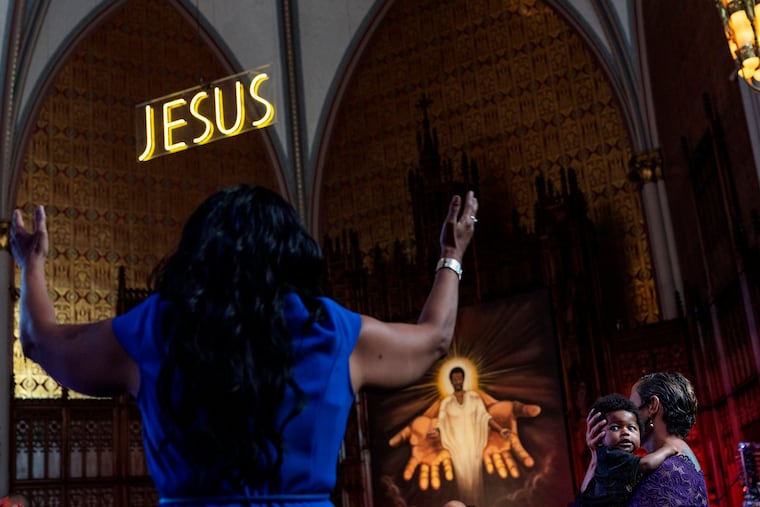Black Catholics deserved recognition in PBS doc on Black churches | Opinion
One writer asked: How many hours long does a Black Church documentary need to be before Catholicism gets airtime and a fair shake?

Here is a public affirmation for all who will listen: Black Catholics Matter.
But based on a recent four-hour PBS documentary on the Black Church hosted by the esteemed Harvard professor Henry Louis Gates Jr., one would conclude that Black Catholics are, at best, a footnote in the United States Black Christian experience. The documentary showed photos of the founder and of another early Mother Superior of the Oblate Sisters of Providence and vintage photos of Black nuns. And then there is that magnificent image of a Black Christ from St. Sabina’s Catholic Church in Chicago.
The truth is that for many of us that documentary was hurtful, dispiriting. Some felt its focus on Black-founded churches was just fine. A spirited debate ensued on a private Facebook page geared to Black Catholics. Still, the editor of Black Catholic Messenger, a digital publication committed to “amplifying Black Catholic voices,” argued that the docu-series chose “spectacle over accuracy.”
Yes, we have had a tough journey in our church. You already know many of the church’s sins. But one of those sins was not discussed in the documentary — the church’s structural racism.
Black Catholics deserve more than images, more than a cursory look in a sweeping package, more than Gates’ strolling through St. Sabina’s Church opining without acknowledging where he is.
Gates does note that about a quarter of enslaved Africans were likely already Catholics when they arrived on these shores from an area in West Africa known then as the Kingdom of Kongo. Its king accepted Catholicism in the 15th century, thanks to the Portuguese. And Gates mentioned the Stono Rebellion against slavery in the colony of South Carolina in 1739 led by those same Catholic folks from Kongo.
That’s all great for establishing the Black Catholic presence in the Americas, but it’s insufficient.
More than 35 years ago, in the midst of the Black Catholic Movement, the 10 Black bishops then in the United States encouraged us to be “authentically Black, truly Catholic” in the expression of our faith. They articulated, in a pastoral letter titled “What We Have Seen and Heard,” that we were most certainly part of the nation’s Black Church and should very much be evangelists in spreading the word with the gift of our Blackness, our African heritage. Black spirituality is contemplative, it is holistic, it is joyful, they wrote. This joy, they said, “is a sign of our faith.”
Back in the day, there were Catholic schools and Catholic churches in the Black community all over Philly. Few of those schools survive now largely because the inexpensive labor — that would be nuns — is no longer available to staff schools. Tuition was next to nothing and those schools were an alternative to what many considered inferior public schools.
In those days, the number of Black Catholics were around 40,000 in the Archdiocese of Philadelphia. Now it is around 20,000. Don’t think I will get an argument on this: Fewer neighborhood schools and parishes create fewer urban Black Catholics. Philly is not alone. One good friend, who has mostly worked in African-American parishes for decades, suggested there is some debate about whether Black Catholics moved on—or whether the church abandoned some of its urban flock. Still, there are still about three million Black Catholics and about 20% of that number worship in predominantly Black congregations, according to the U.S. Conference of Catholic Bishops.
No doubt, much of the Black Church documentary showcased Black Christian denominations founded specifically by Black ministers during the early 19th century, including the African Methodist Episcopalian denomination founded in Philadelphia.
And some of the uproar is likely over the diminishment of the Black Catholic Church even while Black Catholic images were showcased.
Gates and his crew clearly understood the importance of the Oblate Sisters of Providence, established as a Black order of nuns in 1829 largely to teach Black girls. The Oblates sent photos from the motherhouse in Baltimore, then the PBS team decided later that Black Catholics would be left out because of time constraints. The Oblates confirmed it. And Patheos, an online nondenominational outlet, asked independently about the perceived slight, and was told the same.
The producers should have understood the importance of the Society of St. Joseph of the Sacred Heart, the Josephites, an order of priests and brothers founded in 1893, specifically to serve the African American community. And the Society of the Divine Word, an international association of priests and brothers who established the first seminary for Black men in the United States in 1923 in Bay St. Louis, Miss. I am just skirting the surface here.
Nate Tinner Williams, the editor and cofounder of the Black Catholic Messenger, might have raised the most pragmatic question about the Black Church documentary that I have seen amidst all the discussion of this series.
“How many hours long does a Black Church documentary need to be before Catholicism gets airtime and a fair shake?”
Given the brouhaha over this miniseries, the answer may already be apparent. We must raise holy hell.
Michael Days is a partner with Editorsoncall, a former vice president of diversity and Inclusion at The Inquirer, and former editor of the Daily News.